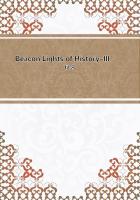"You see," Lady Ruth continued, resting her hand upon her husband's coat sleeve, "the thing happened all in a second. I had the check in my hand when you and Sir William came crashing through that window, and Sir William's eyes were upon me. The only way to save myself was to repudiate it, and let Wingrave get out of the affair as well as he could. Of course, I never guessed what was going to happen.""Then it was Wingrave," Barrington muttered, "who played the game?""Yes!" Lady Ruth answered quietly. "But I am not so sure about him now. You and I, Lumley, know one another a little better today than we did twelve years ago. We have had a few of the corners knocked off, I suppose. I can tell you things now I didn't care to then. Wingrave had lent me money before! He has letters from me today, thanking him for it."Barrington was a large, florid man, well built and well set up. In court he presented rather a formidable appearance with his truculent chin, his straight, firm mouth, and his commanding presence. Yet there was nothing about him now which would have inspired fear in the most nervous of witnesses. He looked like a man all broken up by some unexpected shock.
"If he had produced those letters--at the trial--"Lady Ruth shrugged her shoulders.
"I risked it, anyhow," she said. "I had to. My story was the only one which gave me a dog's chance, and I didn't mean to go under--then. Wingrave never gave me away, but I fancy he's feeling differently about it now!""How do you know, Ruth?"
"I have seen him! He sent for me!" she answered. "Lumley, don't look at me like that! We're not in the nursery, you and I. I went because I had to. He's going to America for a time, and then he's coming back here. I think that when he comes back--he means mischief!""He is not the sort of man to forget," Barrington said, half to himself.
She shuddered every so slightly. Then she stretched out a long white arm, and drawing his head suddenly down to her, kissed him on the lips.
"If only," she murmured, "he would give up the letters! Without them, he might say--anything. No one would believe!"Barrington raised his eyes to hers. There was something almost pathetic in the worshiping light which shone there. He was, as he had always been, her abject slave.
"Can you think of any way?" he asked. "Shall I go to him again?""Useless!" she answered. "You have nothing to offer in exchange. He would not give them to me. He surely would not give them to you. Shall I tell you what is in his mind? Listen, then! He is rich now; he means to make more money there. Then he will return, calling himself Mr. Wingrave--an American--with imaginary letters of introduction to us. He has ambitions--I don't know what they are, but they seem to entail his holding some sort of a place in society.
We are to be his sponsors."
"Is it practicable?" he asked.
"Quite," she answered. "He is absolutely unrecognizable now. He has changed cruelly. Can't you imagine the horror of it? He will be always in evidence;always with those letters in the background. He means to make life a sort of torture chamber for us!""Better defy him at once, and get over," Barrington said. "After all, don't you think that the harm he could do is a little imaginary?"She brushed the suggestion aside with a little shiver.
"Shall I tell you what he would do, Lumley?" she said, leaning towards him.
"He would have my letters, and a copy of my evidence, printed in an elegant little volume and distributed amongst my friends. It would come one day like a bomb, and nothing that you or I could do would alter it in the least. Your career and my social position would be ruined. Success brings enemies, you know, Lumley, and I have rather more than my share.""Then we are helpless," he said.
"Unless we can get the letters--or unless he should never return from America," she answered.
Barrington moved uneasily in his seat. He knew very well that some scheme was already forming in his wife's brain.
"If there is anything that I can do," he said in a low tone, "don't be afraid to tell me.""There is one chance," she answered, "a sort of forlorn hope, but you might try it. He has a secretary, a young man named Aynesworth. If he were on our side--""Don"t you think," Barrington interrupted, "that you would have more chance with him than I?"She laughed softly.
"You foolish man," she said, touching his fingers lightly. "I believe you think that I am irresistible!""I have seen a good many lions tamed," he reminded her.
"Nonsense! Anyhow, there is one here who seems quite insensible. I have talked already with Mr. Aynesworth. He would not listen to me!""Ah!"
"Nevertheless," she continued softy, "of one thing I am very sure. Every man is like every woman; he is vulnerable if you can discover the right spot and the right weapons. Mr. Aynesworth is not a woman's man, but I fancy that he is ambitious. I thought that you might go and see him. He has rooms somewhere in Dorset Street."He rose to his feet. A glance at the clock reminded him of the hour.
"I will go," he said. "I will do what I can. I think, dear," he added, bending over her to say farewell, "that you should have been the man!"She laughed softly.
"Am I such a failure as a woman, then?" she asked with a swift upward glance.
"Don't be foolish, Lumley. My woman will be here to dress me directly. You must really go away."He strode down the stairs with tingling pulses, and drove to the House, where his speech, a little florid in its rhetoric, and verbose as became the man, was nevertheless a great success.
"Quite a clever fellow, Barrington," one of his acquaintances remarked, "when you get him away from his wife."















